

CHENNAI: As global temperatures rise, adopting proper precautions when exercising—especially during summer—becomes increasingly important. This article discusses the risks associated with summer exercise, particularly for individuals training in extreme heat, such as those preparing for police or military recruitment, gym-goers, and people working toward weight loss. A primary concern is the risk of heat-related health issues, including dehydration, heatstroke, and electrolyte imbalances, which can lead to symptoms like dizziness, fainting, and sudden drops in blood pressure.
Many young individuals rigorously train outdoors in extreme heat to prepare for police or military jobs. However, if proper hydration and exercise routines are not followed, this can lead to serious health complications. Overexertion in gyms, particularly when lifting weights beyond one’s capacity, also increases the risk of heart-related issues.
Mrinali Dwivedi, a Mumbai-based Consultant Nutritionist and Clinical Dietitian, emphasises the dangers associated with fitness trends that persist throughout the summer. As gyms remain crowded year-round, many individuals push themselves with intense cardio and weight training despite the extreme heat. This dedication, when approached without proper precautions, can be hazardous. In particular, improper consumption of protein powders and supplements can strain the liver and kidneys. Moreover, trying to achieve rapid weight loss can lead to over-exercising, which places unnecessary strain on muscles and increases the risk of injury. Overexertion can even cause muscle damage and long-term health concerns.
Dwivedi stresses the importance of staying cool while exercising in the summer. It’s crucial to avoid overtraining and allow the body sufficient rest. Proper nutrition and heeding warning signs are also essential, she suggests. Adequate nutrition before and after workouts is vital. Dwivedi recommends prioritizing natural protein sources and staying hydrated to maintain energy levels. Additionally, it is crucial not to ignore warning signs such as chest pain, dizziness, breathlessness, or a rapid heart rate during exercise. Continuing to work out under such conditions can be extremely dangerous.
Important Tips on Timing, Clothing, and Hydration Levels
Other health experts recommend exercising early in the morning to avoid the peak heat, which typically occurs between 12 PM and 4 PM.
While drinking sufficient water and electrolyte-rich beverages throughout the day is important to maintain hydration, choosing breathable, lightweight clothing can also help regulate body temperature during exercise and prevent heat-related issues.
For pre-workout nutrition during summer training, experts suggest foods rich in natural sugars and protein, such as bananas, dry fruits, oats, and other protein-rich options, to fuel the body before workouts.
Equally important is to avoid exercising on an empty stomach. Working out without eating can lead to energy depletion, making it harder to perform and increasing the risk of injury.
Additional Medical Insights on Summer Exercise
Understanding the risks of heat-related illnesses, such as heat exhaustion and heatstroke, is essential. These conditions occur when the body’s temperature rises too high and cannot cool itself effectively. Symptoms of heat exhaustion include heavy sweating, weakness, dizziness, nausea, and headache. Heatstroke, a more severe condition, is marked by confusion, a rapid pulse, and even loss of consciousness.
Similarly, dehydration is more rapid during the summer due to increased sweating, so it's crucial to replenish fluids regularly, especially after intense exercise sessions.
Sweating leads to the loss of electrolytes, which are essential for muscle function and nerve signaling. Consuming drinks that replenish electrolytes (like sports drinks) or eating electrolyte-rich foods (such as bananas, oranges, or avocados) can help maintain balance.
While dedication to fitness goals is admirable, it is important not to sacrifice health in the pursuit of fitness. Regular breaks, proper rest, and avoiding the hottest parts of the day are critical for safe exercise during the summer.